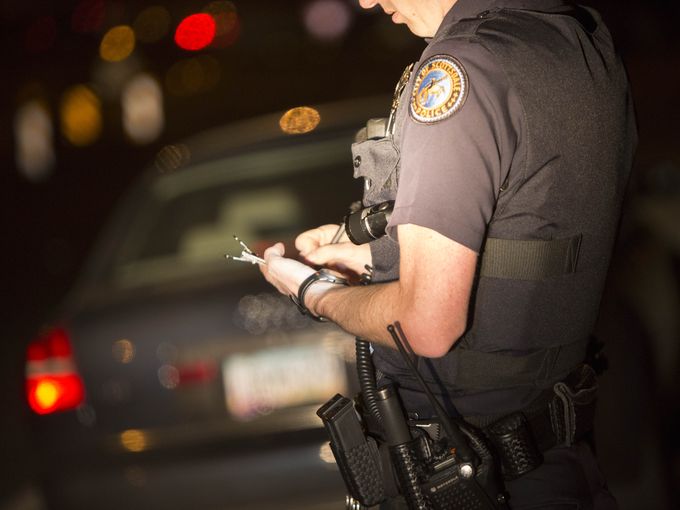Flagstaff Drug Transportation Lawyer
Transportation of Marijuana For Sale in Flagstaff, AZ

Arizona, California, New Mexico, and Texas are all Border States with Mexico. As a result, they are considered “source” states for marijuana. Marijuana is commonly smuggled from Mexico into the United States through source states. It is very common for a person from another state to drive to Arizona and obtain large amounts of marijuana and then return to their home state. Large amounts of marijuana will commonly be considered as marijuana intended for sale. For example, it’s unlikely that someone caught with 200 pounds of marijuana will consume all 200 pounds. Even for heavy users of marijuana, this would take years, if not decades to ingest. The likely conclusion to prosecutors is that this much marijuana would be intended to sell.
Arizona Highway Patrol Officers

In Arizona, the highway patrol officers are with the Arizona Department of Public Safety. These officers are typically called DPS officers. They are extremely skilled in drug interdiction. Oftentimes, they will have drug canines in their vehicles. Besides the typical duties of highway traffic patrol, DPS officers are also attempting to prevent the transportation of illegal drugs. In Northern Arizona, the highways where drug transportation is most common are I-40 and I-17. I-40 runs east and west through Northern Arizona and I-17 runs north and south through the center of the State.
A Typical Drug Transportation Of Marijuana For Sale Police Encounter
In my opinion, DPS officers are looking to stop any driver for any suspected traffic offense. The reason is that, statistically, the more stops the police have, the more likely they are to come into contact with drug offenders.
By law, a police officer cannot detain a suspect more than is necessary to effectuate the purpose of the original stop. If an officer pulls a suspect over for a traffic offense, the officer must only keep the driver pulled over as long as necessary to issue the traffic ticket or warning, unless he develops reasonable suspicion to investigate another offense during the encounter. Police encounters are routinely prolonged so that the officer can obtain as much information as possible to form probable cause to search the vehicle.
DPS officers are especially more likely to stop a vehicle for any arguable traffic offense combined with “indicators” of drug activity. These include but are not limited to, the following: having out-of-state license plates, driving a rental car, having multiple air fresheners, portraying behavior that is meant to deflect police attention (sitting erect in your car, having 2 hands on the steering wheel at the 10 and 2 position, dressed in a non-casual manner, staring straight ahead, not looking at the police, etc.).
Most people are nervous when pulled over by the police. If a person is transporting drugs, he/she will commonly be especially nervous with any police contact. Once a person is stopped, the DPS officer is likely to tell the person the basis for the stop and tell them they are getting a warning. Rarely, if ever, do they actually give out a traffic ticket. From a police perspective, once a person is told they are to be given a warning, the nervousness should subside because there is no actual consequence of the traffic infraction. To the police, if the person remains nervous, this is an additional indicator of drug trafficking. In their view, there is nothing to be nervous about because a warning is being issued.
Typically, the officer will then ask for the person to exit the vehicle as a warning ticket is being written. The police can legally do this in Arizona. As the DPS officer is drafting the warning, he/she will then begin to ask a person a series of questions regarding the trip. For example: where are you from? where were you in Arizona? how long were you there? what was the purpose of your trip? etc. If your story doesn’t make sense, this will be another indicator of criminal activity.
Remember, in Arizona, you do not have to answer any questions that a police officer asks you other than providing your name and address. You do have a right to remain silent. Do not think that you are smarter than the police; you are not. They are trained professionals who are very good at their jobs.
After the warning ticket is given you are “free to go.” However, just as you are about to reach for the door handle and get into your car, the DPS officer will then typically ask if they can continue with the conversation. They ask for permission so that the continued conversation is arguably voluntary. You have the right to tell them no, but rarely does this happen. The officer will typically state, “We have had a big problem with people transporting illegal drugs, guns, and large amounts of money in this state. Do you have any illegal drugs, guns, and large amounts of money?” If the person says yes, the car is then searched. If the person says no, the officer will then ask for permission to search the car. If the person gives consent to search, anything illegal in the car will be located and the person is then arrested and prosecuted. Every person should remember that they have a right against unreasonable search and seizure. Whether or not you’re conducting illegal activity, you can always say no when the police ask to search your car.
If a person refuses to give consent to search, the officer will then typically ask for permission to have his/her drug canine sniff the outside of the car. Once again, you can always say no when the police ask to walk their drug canine around your car. If you give the police permission to walk the drug dog around your car, the prolonged detention of the stop may be considered voluntary. If the drug dog alerts, your car will be searched. If anything illegal is in the car, it will be located and the person is then arrested and prosecuted.
Transportation Of Marijuana For Sale And Bond

In Arizona, the severity of the punishment depends on the amount of marijuana being transported. If the weight is greater than 2 pounds, the offense will be classified as a class 2 felony. A class 2 felony is punishable from 3 – 12.5 years in prison and a fine up to $150,000.00, plus applicable surcharges. Also, 2 pounds of marijuana is the “threshold amount.” This means that prison is mandatory and probation is not available if convicted at trial.
If the weight is less than 2 pounds, the offense will be classified as a class 3 felony. A class 3 felony is punishable from 2 – 8.75 years in prison and a fine up to $150,000.00, plus applicable surcharges. Probation is also an option for the court.
These sentencing ranges are for first-time offenders.
Defenses To Transportation Of Marijuana For Sale Charges in Arizona
There may be numerous defenses in these type of cases, including but not limited to:
- Constitutionality of the stop;
- Constitutionality of the detention;
- Constitutionality of the search of your vehicle or person;
- Level of knowledge;
- Drug canine reliability issues;
- Miranda violations;
- Denial of counsel violations;
- Chain of custody issues; and
- Drug testing issues.
Contact Our Flagstaff Drug Transportation Attorneys Today
Obtaining a Transportation of Marijuana for Sale charge is a life-altering event. You can go to prison for years. You can be fined up to $150,000.00, plus applicable surcharges. If convicted you will also lose your civil rights. Without any doubt, this will be an extremely stressful situation.
Glazer, Hammond & Smets, PLLC can effectively evaluate the circumstances surrounding your case to create a solid defense that will help you achieve the least severe sentence possible.
Take the time to meet with us and discuss your case. We offer free case consultations to inform you of your options and put your mind at ease.






